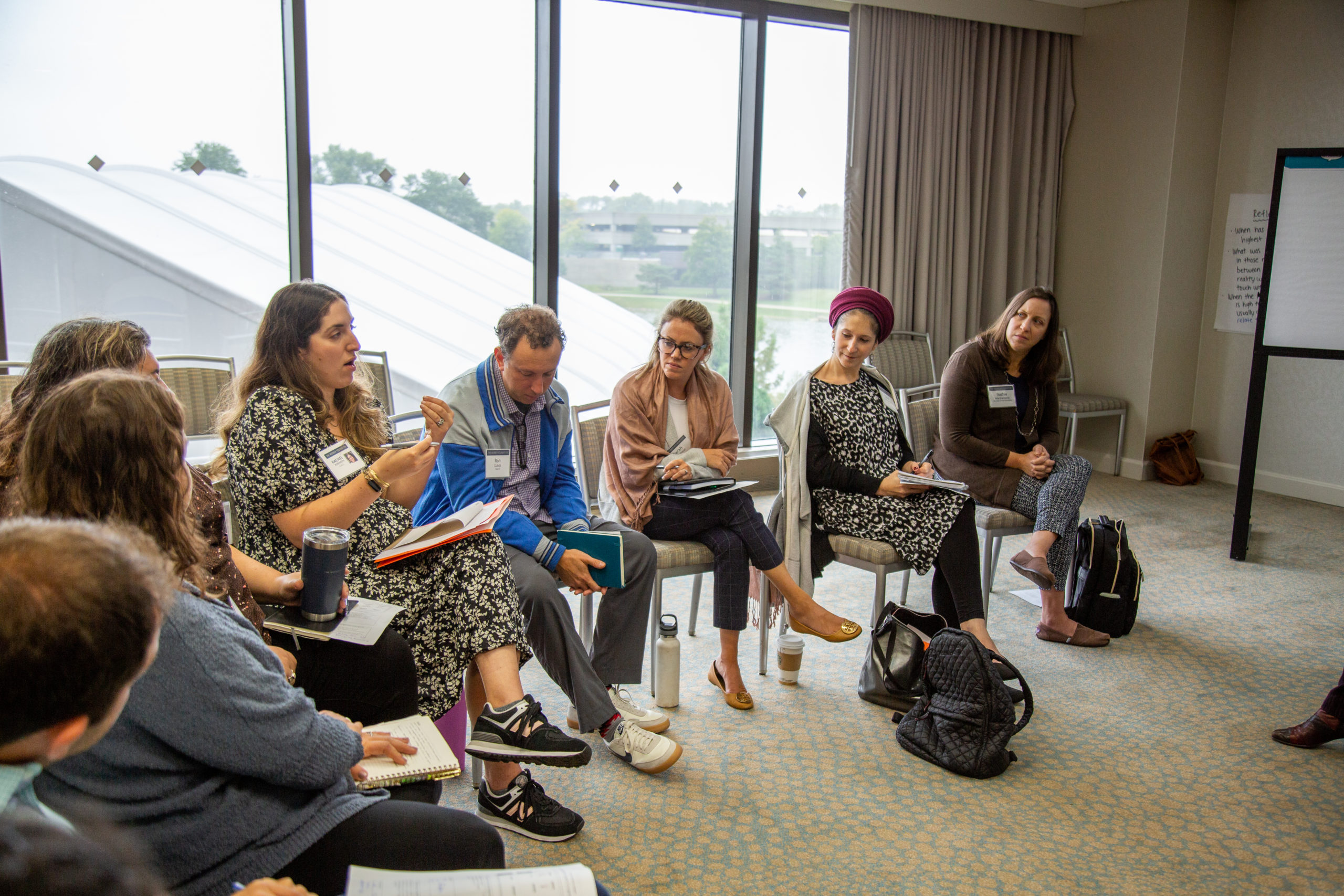OUR MISSION

We require applicants to any Wexner Foundation program to read this Mission Statement. Our Wexner Members and Fellows are expected to understand and respect our mission.
The Wexner Foundation develops and inspires leaders in the North American Jewish Community and the State of Israel. Through pluralistic, cohort-based educational initiatives, the Foundation invests in promising professionals and volunteers, giving them tools to exercise transformative leadership toward a stronger Jewish future and a thriving State of Israel.
Working in partnership with other foundations, federations, philanthropists, and organizations, the Foundation contributes to the development of a robust, meaningful, and increasingly diverse North American Jewish community. We thoughtfully stretch Wexner cohorts across a wide range of viewpoints about what will best strengthen our Jewish future.
We invest in individuals seeking to contribute to a professional, fully representative, and collaborative civil service in the State of Israel. The Wexner Foundation aspires to contribute to a secure, vibrant Jewish and Democratic state through its commitment to the public service.
The Wexner Foundation is committed to Ahavat Yisrael, a love for the entirety of the Jewish People and actively fosters enduring connections between Wexner leaders in North America and Israel.
CORE VALUES

We pursue our work with integrity, transparency, and in the pursuit of excellence. We identify selected attributes, among many worthy choices, that we believe capture the essential spirit we bring to our learning of Torah and leadership learning. Our philosophy of leadership development is based on an artful mix of individual talent, a thoughtful curriculum, and, essential to our success, a diverse by design peer cohorts.
We frame many of these qualities as a dynamic continuum. We challenge all “Wexners” to, in their pursuit of transformational leadership, intentionally calibrate and deploy these values appropriately and thoughtfully between these ranges of expressions.

Emotional Intelligence
We value emotional intelligence, binat ha’lev, a heart of understanding and compassion.
Jewish mystical wisdom suggests that the heart holds over 60 emotions. The number 60 [tractates in Talmud, gates of understanding, e.g,] symbolizes the richness and complexity of human emotion and full spiritual presence. Among other things a binat lev sees, hears, speaks, stands, rejoices, weeps and comforts. Emotional intelligence is marked by an intentional effort to understand the heart’s expansive capability. This understanding is rooted in self-awareness, a mastery of reflective practice, the capacity to listen, to manage our own desires, face our fears and biases, be open with our vulnerabilities, and to see the other fully. Leaders are called upon to be attentive to the full range of one’s heart. An understanding and compassionate heart must be intentionally cultivated. The understanding heart, itself a muscle, requires ongoing and demanding exercise.
“The heart of leadership is connection, and connection is about empathy, curiosity, and emotional courage.”
– Brene Brown

Curiosity
…hafoch ba v’hafoch ba, turn it and turn it again for everything is in it. – Avot 5:22
Organizational cultures tend to make us cautious about change and lull us to be overly comfortable with the status quo. In a posture of generous listening, we demonstrate the capacity to be curious and focus on asking genuine questions to lead us forward, to take ourselves down previously unconsidered and productive paths. Curious leaders are energized by open conversations centered on the question “what might we become?” Curiosity does not demand answers, only contemplating what those answers might be without judgment. In short, curious leaders ask before they tell.
“Generous Listening replaces judgment with curiosity, an open mind, and a genuine desire to learn and to understand, not to win.”
– Donna Kaplowitz

Personal Jewish Identity
Hillel teaches, “If I am not for myself, who will be for me? If I am only for myself, what am I?” – Avot 1:14
Every Wexner cohort in North America is comprised of individuals representing different expressions of Jewish and our Israel cohorts include participants from across the spectrum of Israel’s citizens. The Foundation’s leadership development relies on diverse cohorts who typically develop unique and lasting bonds. Our members and Alumni are expected to respect one another’s truths while not being asked to erode the importance and vitality of their own. In a circle of Wexner learners, participants strengthen and sharpen one another’s leadership agenda. Abiding by established rules of engagement, cohorts conduct civil discourse across significant differences. Giving others the benefit of the doubt as to their sincerity and integrity forms the baseline of healthy relationships and enables effective collaboration. Discovering how to balance the needs of the group with one’s honed identity is where Wexner members experience productive discomfort. In this pluralistic space meaningful growth emerges for the individual and the group.
“Dialogue means both speaking and listening; [a] process that reveals both common understandings and real differences. Pluralism involves the commitment to being at the table—with one’s commitments… I can observe diversity. I can even celebrate diversity…But I have to participate in pluralism.”
– Dr. Diana Eck

Urgency
“We do not have the luxury of being overwhelmed,” Ruth Messinger teaches.
It is an important lesson for those who lead. Why? Because communal change is rarely sudden, except in times of crisis when urgent action is inevitably required. Patience paves the way to a discovery of what will advance our communities. It is required to reveal our true passions and purpose. Patience calls on us to “go slow to go fast” especially during the sometimes-long hours or drawn-out processes of decisive action. Quick fix thinking oversimplifies the reality that to move forward, we need to be active on dozens and dozens of fronts. Hillel the Elder’s essential questions in Avot 4:14 concludes with this, “If not now, when?” While sometimes interpreted as rhetorical, it can also be considered a real time pressing question. Is an immediate intervention necessary? Do I need to exercise leadership right now? Moving too quickly might mean that you are suggesting changes others are not ready to hear. Waiting too long might mean that you miss the opportunity altogether.
“How wonderful it is that nobody need wait a single moment before starting to improve the world.”
– Anne Frank

Confidence
The balance between these two attributes is famously illustrated by Rabbi Simcha Bunam’s teaching, “Everyone must have two pockets that they can reach into the one or the other, according to their needs. In the right pocket are the words: ‘For my sake the world was created,’ and in the left: ‘I am but dust and ashes.’”
Humility, a bedrock leadership value, represents the gateway to all learning. In a humble stance one can embrace shortcomings. The path to meaningful collaboration, necessary for a vibrant Jewish future, begins with the capacity to make room for the wisdom and experience of others. Knowing when to speak more or say less, or when to say nothing is paramount to the effective exercising of leadership. It is expressed well in the helpful motto, “no more than my space, no less than my place.”
Exercising leadership, an act of courage, also calls on the individual to discern that they are the right person to intervene to advance meaningful change. There are moments or situations when taking up more space is called for. Leaning into your expertise and assessing wisely your own capacity to influence a community is an act of confidence. When do you step up and meet the moment in a way you believe is incumbent upon you to do? This is an act of considered confidence famously modeled by Queen Esther when it was said to her, “And who knows, perhaps you have attained to royal position for just such a crisis.” Esther 4:14. Balancing humility with confidence is an artful consideration for those who exercise leadership.
“Where what you want to do meets what needs to be done, that is where the Holy One wants you to be.”
– Lord Rabbi Jonathan Sacks

Seriousness of Purpose
A person in a joyful mood, according to the Ruach Chaim, can learn more in an hour than a somber person can in many hours.
Leadership, though an extraordinarily serious undertaking, can be buoyed by creativity, playfulness, and joy. Leading should be uplifting and fulfilling, illuminating, and not diminishing the light of our neshama, our soul. Simcha, joy, is essential to weave into our leadership leaving less room for despair, which we will inevitably experience in our leadership pursuits. And levity must be held in check when a situation demands serious and purposeful strategies to meet challenges that are complex, difficult, and demanding serious attention. There are times when joy or humor must be tabled in the face of volatile, unyielding, or even existential challenges.
“Getting to the top is fantastic, but the climb is also an adventure.”
– Ada Yonath

Realism
David Ben-Gurion, Israel’s first President articulated his point on this continuum when he said, “In Israel, in order to be a realist, you must believe in miracles.”
It is incumbent upon leaders to hold high the promise of a brighter future, making the possibility of that future even more probable. Optimism will be eroded by cycles of ugliness, fear, or conflict. And yet we cling to optimism. Leadership requires a robust vision for our People and for the world. Optimism is contagious and a dependable recruitment tool for urging others to join you in that vision. Effective leaders open eyes to what others might not yet see. At the same time, unbridled optimism must not veer into naiveté. Skillful leadership necessitates balancing optimism and reality. This calibration is complicated but essential. It is only through an honest assessment of reality that we can lead toward a brighter and better future. And we shall.
Do you know the joke about the Jewish optimist?
The Jewish pessimist says, “Oh my God, things could not be worse.”
And the Jewish optimist says, “Of course they could!”

Title Goes Here
Insert quote or intro sentence here.
Body paragraph goes here.
“Important quote goes here.”
– Quote Source
